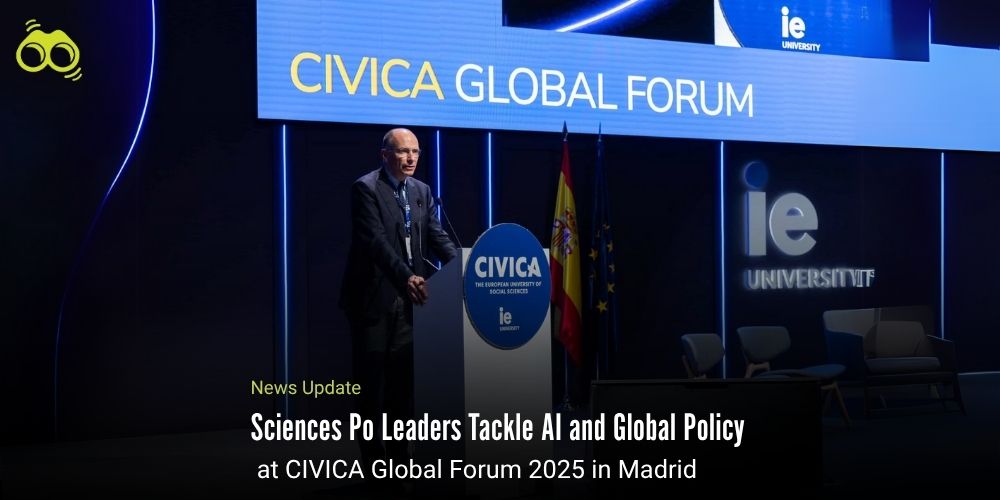AI, Interdisciplinary Collaboration, and European Competitiveness Take Center Stage at CIVICA Forum
Social Sciences at the Forefront: CIVICA Global Forum Highlights the Role of Research in Addressing Global Complexities
In an era where higher education is increasingly shaped by technological advancements, global competitiveness, and interdisciplinary collaboration, the CIVICA Global Forum 2025 provided a crucial platform for dialogue on the evolving role of social sciences in academia. Hosted by IE University on 6 and 7 May, the event brought together key academics, policymakers, and industry leaders to explore the challenges and opportunities facing international education.
Organised through CIVICA – The European University of Social Sciences, the two-day forum, themed "Leveraging Social Sciences in Higher Education: Navigating Global Challenges and Complexities," fostered engaging discussions on European competitiveness, the integration of artificial intelligence in academia, and the shifting dynamics of global education. With high-profile speakers from multiple sectors, the event underscored the importance of innovation, strategic policymaking, and equitable collaboration in shaping the future of higher education across Europe.
Among the institutions actively engaged in the discussions at the event was Sciences Po, which sent a delegation of six prominent speakers. The university’s participation reflected its ongoing commitment to fostering international collaboration and advancing academic research, particularly in the social sciences.
The speakers included Jean-Philippe Cointet, Director of the Open Institute for Digital Transformations and Associate Professor at the médialab; Arancha González, Dean of the Paris School of International Affairs (PSIA) and former Spanish Minister of Foreign Affairs; Christine Musselin, Dean of Research; Jeremy Perelman, Vice President of International Affairs; Marie Azuelos, Deputy Vice President for International Affairs; and Dina Waked, Dean of the School of Research.
The event was also organised by CIVICA, an alliance that unites ten leading European higher education institutions specialising in social sciences, humanities, business management, and public policy. This network brings together a community of 72,000 students and PhD candidates, alongside 13,000 academic staff. The member institutions include Bocconi University (Italy), Central European University (Austria), European University Institute (Italy), Hertie School (Germany), IE University (Spain), National University of Political Studies and Public Administration (SNSPA, Romania), Sciences Po (France), SGH Warsaw School of Economics (Poland), Stockholm School of Economics (SSE, Sweden), and The London School of Economics and Political Science (LSE, United Kingdom).
The conference underscored the growing importance of interdisciplinary collaboration in addressing global challenges and reaffirmed the alliance’s commitment to strengthening academic exchange across Europe. Participants stressed the need for sustainable education policies, enhanced cooperation between research institutions, and greater integration of digital transformations to ensure that higher education remains competitive in an increasingly dynamic world. With discussions highlighting the impact of AI, policy reform, and international partnerships, the CIVICA Global Forum 2025 provided an essential space for thought leaders to shape the future of European higher education. Ultimately, it served as a pivotal platform for fostering the innovation and collaboration necessary to navigate the complexities of the global educational landscape.
Editor’s Note:
The CIVICA Global Forum 2025, held at IE University, marked a pivotal moment in the conversation about the future of higher education. Bringing together experts from academia, policy, and industry, the event underscored the growing importance of social sciences in navigating global challenges. Discussions on artificial intelligence, European competitiveness, and the evolution of global education highlighted the need for innovation, sustainable policies, and interdisciplinary collaboration.
Skoobuzz underlines that with notable contributions from institutions like Sciences Po, the forum reaffirmed the value of international partnerships and academic exchange. It was clear that as education evolves, it must remain adaptable, inclusive, and ethically grounded, ensuring it stays relevant in an increasingly digital world. The forum was a timely reminder of the importance of strategic policymaking and collaboration in shaping the future of European higher education.














0 Comments (Please Login To Continue)